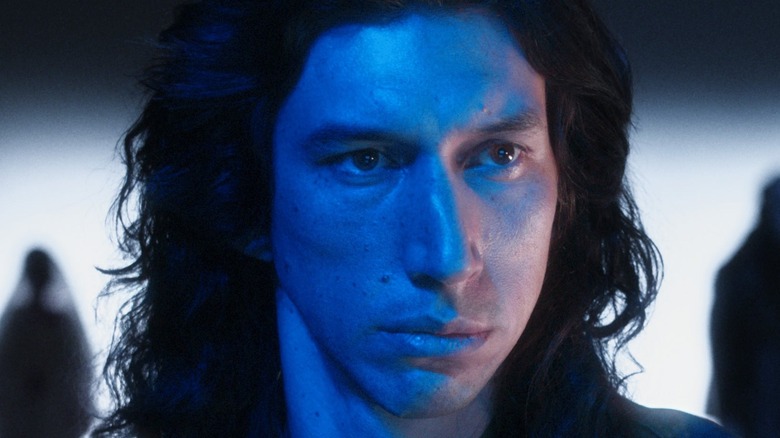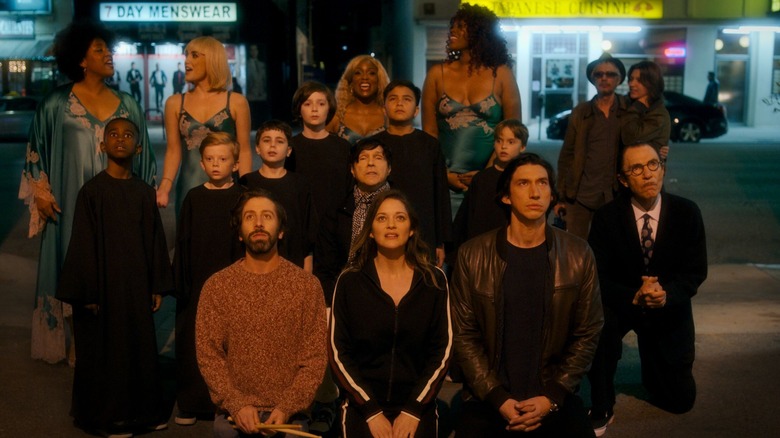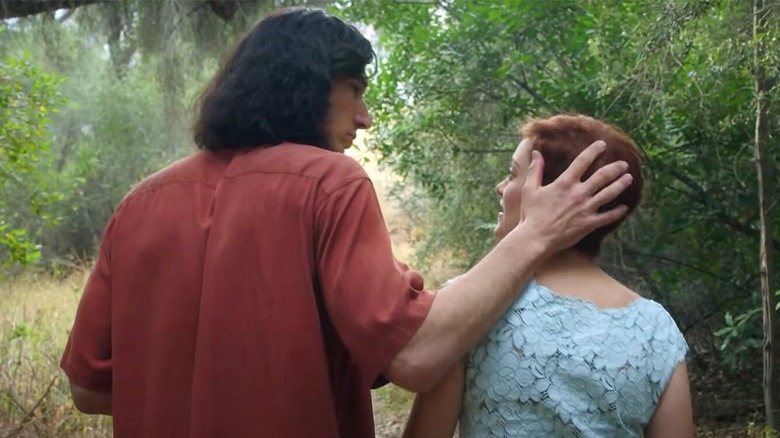Annette Review: Love, Loss, And A Singing Puppet Baby
If you caught Edgar Wright's documentary "The Sparks Brothers," you'll know that the eccentric pop duo Sparks (aka brothers Ron and Russell Mael) have had multiple missed opportunities at creating their own movie musical. The pair were obsessed with French cinema of the 1950s and '60s, and were overjoyed to be approached by the comic actor and director Jacques Tati in the late 1970s — only for Tati to sadly pass away as their project neared production. Ten years later, they were approached to make a musical adaptation of the manga "Kai, The Missing Girl" by none other than Tim Burton. Like the musical they planned to make a decade before, it now exists as one of the most intriguing films never made.
Nearly 50 years after they were supposed to make the transition to the big screen, we finally have a demented rock opera courtesy of the duo and the hyper-stylish French filmmaker Leos Carax. "Annette," much like the music of Sparks, will likely prove to be an acquired taste, a 140-minute tragic romance pitched somewhere between "A Star Is Born" and a Bo Burnham standup special, with a title character who is quite literally a puppet. I can't pretend the film fully won me over, but there is something endearing about the way the director embraces the artifice of a big-screen musical, to the extent it often looks like a taping of a particularly avant garde Broadway production. There is substance beneath this style, but it proves less affecting — despite the film's epic length, the characters never come alive in the same way as the meticulously designed film around them.
A personal story, with puppets
Henry McHenry (Adam Driver) is a provocative standup comedian nicknamed "the ape of God," his sets light on jokes but heavy on self-loathing ramblings and inexplicable musical interludes. His wife Ann Defrasnoux (Marion Cotillard) is a renowned opera singer whose audiences never get to learn about her the same way, always hiding behind a character who dies at the end of each performance. The pair are constantly in the media spotlight and madly in love, with the world watching as Ann gives birth to their first baby, Annette. It's at this time Henry's career hits a bump in the road, as multiple women come forward to give accounts of the abuse he inflicted upon them, while he gets into further controversy in Las Vegas via a prolonged routine where he describes tickling his wife to death.
That this proves to be the final nail in the coffin for him, and not the various women recounting his abusive behavior (a fact introduced in a highly specific number entitled "Six Women Have Come Forward," then barely mentioned again), is one of the film's more bizarre narrative choices, and makes it harder to buy into the tragic character study beneath the artifice. Nevertheless, Henry discovers a new calling in baby Annette, who he discovers has an angelic singing voice, and calls Ann's orchestral conductor (Simon Helberg — yes, Howard from "The Big Bang Theory" is in this movie), to hear her. From there, it isn't long before Baby Annette becomes the world's biggest pop superstar.
Leos Carax and Sparks make for a unique combination of artist and director precisely because they have differing sensibilities. Despite coming to prominence in the 1980s as part of the Cinéma du look movement (often written off by critics of the time as style over substance) that also gave the world Luc Besson, Carax's films are sincere in their tragic romanticism. Sparks, on the other hand, have made half a century's worth of music defined by an ironic sense of humor, their songs usually either blackly comic character studies, depictions of sexual dysfunction, or satires of contemporary culture. Taken at face value, it would be easy to assume that they had a stronger authorial voice over the project than the director, the story seemingly a parody of a classic Hollywood narrative formula, with plot points related to tabloid hysteria and the concept of celebrity itself.
What makes "Annette" so fascinating is that on further inspection, this musical fever dream is the director's most personal work. His 2012 film "Holy Motors" is considered by many as one of the decade's best films, and was initially treated as a love letter to the limitless possibilities of cinema — a place where talking limousines, chimpanzees, and Kylie Minogue musical numbers could arrive without a moment's notice. But that film was a much more melancholic work, affected by the death of his wife (the actress Yekaterina Golubeva) in 2011, while the film was in production. "Annette" is very much the director crafting a eulogy for a partner and creative collaborator, its later stages proving the most affecting due to how it eventually grapples with the idea of treating our loved ones as artistic muses.
A complex character who can't be examined through lyrics alone
The problem is that this moving end to a character arc comes long after the film struggles to grapple with the abuse and recklessness of its main character. Henry McHenry has a distinctively nihilistic view of the world when on stage, the film framing his performances with audiences as a Greek chorus, fans practically laughing on command despite the lack of any actual gags. But this is the closest we come to grappling with a history of erratic behaviour (and to a lesser extent, how culture continues to celebrate abusive men), introduced as a plot point but never explored to any great effect, remaining a fairly reductive portrait of a tortured artist. Adam Driver is, as expected, fantastic in the role, but Henry McHenry is still a frustrating creation.
As an additional problem, the narrative is so framed around this lead character and his neuroses that the wider emotional arc of the drama is less impactful. Marion Cotillard is the standout musical performer (she even does the voice for Baby Annette!), her solo sequences the most handsomely devised by Carax, including one exceptional sequence in which a theatre stage transforms into a fairytale forest. But her character and her role in the central relationship often feel like an afterthought at best, a mere narrative device at worst.
Sparks are known for the effective way they use repetition in their songs, with the recent "Sparks Brothers" documentary highlighting one entitled "My Baby's Taking Me Home," which repeats the title so much it keeps taking on new meanings. Here, a similar technique used in a song called "We Love Each Other So Much" falls flat — it often feels like the song is trying to tell us what the film itself is struggling to show. Yes, "Annette" is very deliberately artificial in its design, but the heart of its tragic central romance seldom registers until its affecting finale, the lyrical simplicity getting in the way of a more complex character study that can't be fully fleshed out in song. There is much to admire in Carax's singular approach to the movie musical, which only makes these missteps all the more frustrating.


